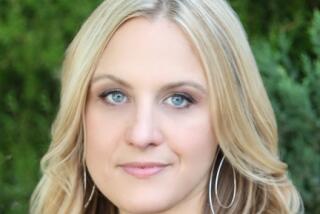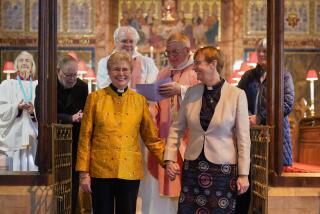Church leader thinks worst is over
- Share via
The presiding bishop of the Episcopal Church declared Thursday that church members who joined a newly formed conservative denomination “are no longer Episcopalians,” even as she predicted that the exodus had largely run its course and would not trigger further large-scale defections.
In her first public comments since a coalition of 700 parishes announced the formation of a new North American church Wednesday, the Most. Rev. Katharine Jefferts Schori also reiterated that church property must remain in Episcopal hands, a position disputed by breakaway leaders.
“They are no longer Episcopalians,” Jefferts Schori said of those who left. “They have made that very clear in their departures.
“Those who were formally bishops in the Episcopal Church are no longer understood to be bishops in the Episcopal Church,” she added in a meeting with Times reporters. “They are free to associate with whom they wish.”
Leaders of the new Anglican Church in North America have taken issue with what they view as the Episcopal Church’s liberal policies on the role of gays in the church. They agreed, however, with Jefferts Schori on at least one point.
“We are not Episcopalians; we are Anglicans,” said Bishop Martyn Minns, whose group, the Convocation of Anglicans in North America, helped create the new Anglican church.
The Episcopal Church is the American arm of the 77-million-member Anglican Communion. The global body has 38 self-governing provinces and is led by the archbishop of Canterbury.
Along with other Protestant denominations, the Episcopal Church in recent years has struggled to hold together theologically disparate factions at odds over issues involving sexuality and biblical authority. The current crisis was precipitated by the 2003 ordination of a partnered gay priest as bishop of New Hampshire.
The 700 breakaway churches, primarily from the U.S. but some from Canada, had previously voiced their discontent by placing themselves under the jurisdiction of conservative Anglican leaders abroad, including those in South America and Africa.
Leaders of the new coalition said interest was growing as disaffected congregations and dioceses looked to them for alternatives to the Episcopal Church.
But Jefferts Schori said she expected the departures to have little effect on the 2.4-million-member Episcopal Church. The new Anglican Church in North America has an estimated 100,000 members.
“I think we’re on the downhill side,” she said. “I think by far the majority of those who are going to seek a spiritual home elsewhere have done it. I don’t see any other diocesan leaders on the sideline about to do this. I think we’re past the worst of it.”
Jefferts Schori said she had tried to persuade leaders of the newly formed church not to leave, but traditionalist bishops rejected the overtures.
She said that four former Episcopal dioceses, including one in the San Joaquin Valley that a year ago became the first to secede, had stopped their financial contributions to the national church, in some cases years earlier.
She emphasized that all Episcopalians were welcome “if they want to be part of a diverse church. . . . But the expectation has to be that we are not a single-issue church. We’re not a church that says you have to believe this one thing in this one way and there is no room for difference of opinion.”
The Episcopal leader made her comments ahead of an Episcopal Diocese of Los Angeles convention that begins today. The Los Angeles bishop, the Rt. Rev. J. Jon Bruno, joined her for the meeting with reporters.
Jefferts Schori said those who chose to leave the church were free to do so but were not free to take its property with them.
The national church and its dioceses, including Los Angeles, have filed numerous lawsuits over church buildings and other property claimed by breakaway parishes. A key case, involving several Southern California congregations, is before the state Supreme Court, with a decision expected by early January.
“The property that belongs to the Episcopal Church, to congregations and to dioceses is the product of legacies of generations before us, given . . . in the name of the Episcopal Church,” the presiding bishop said.
“Leaders in the church do not have the right to give it away for other purposes.”
Leaders of the new North American church said that the provisional constitution they adopted Wednesday made it clear that church buildings belong to individual congregations. But they said they hoped to avoid lawsuits.
“It is our position that wherever there is the opportunity to stay away from litigation, we pray that happens,” said Robert Lundy of the Common Cause Partnership, which is leading the new effort.
The new church also must resolve other delicate issues, including questions about official recognition within the Anglican Communion.
Episcopal leaders said that an international church body, the Anglican Consultative Council, must decide the matter, but officials with the new North American group said they expected to be recognized by leaders of a number of the communion’s regional and national churches.
They said they formed their church at the urging of seven such leaders who called for a new North American province during a meeting in Jerusalem last summer.
--
More to Read
Sign up for Essential California
The most important California stories and recommendations in your inbox every morning.
You may occasionally receive promotional content from the Los Angeles Times.













